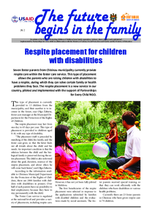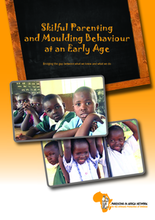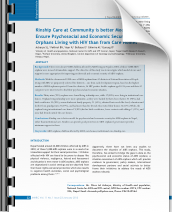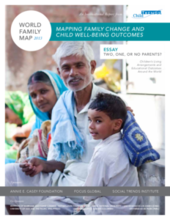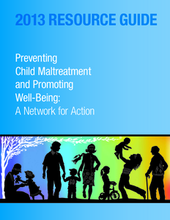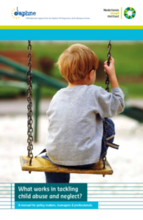Displaying 751 - 760 of 947
This Recommendation by the European Commission on Investing in Children, stresses the importance of early intervention and preventative approaches, and makes quality childcare one of its key policy areas to break the cycle of disadvantage in early years and reduce the risk of child poverty and social exclusion.
This 10-page newsletter, translated into English, is issue number two of a series produced by the “Protecting children of Moldova from family separation, violence, abuse, neglect and exploitation” project, which is implemented by Partnerships for Every Child, the Ministry of Labour, Social Protection and Family of Moldova, and the Ministry of Education of Moldova.
This new study by Parenting in Africa Network (PAN) was conducted in three regions in Kenya (Nairobi, Mombasa and Busia), involving primary care givers of children age 0-8, children participating in Early Childhood Development and Education centers, and stakeholders and professionals involved in skillful parenting and early childhood development.
The objective of this study was to investigate which model of care and support is more appropriate for improving psychosocial and economic security of AIDS orphans in Nepal.
Care related Concluding Observations adopted by the Committee on the Rights of the Child on the initial report of Burkina Faso under the Optional Protocol to the Convention on the Rights of the Child on the sale of children, child prostitution and child pornography.
The World Family Map Project is a new initiative by Child Trends to monitor the health of family life around the globe and to learn more about how family trends affect the well-being of children. Using internationally comparative data for low-, middle-, and high-income countries on key characteristics of families, including family structure, family socioeconomics, family processes, and family culture, the Map looks at trends in 45 countries, representing every region of the world.
This Resource Guide was developed to support service providers in the US in their work with parents, caregivers, and their children to prevent child abuse and neglect and promote child and family well-being. The Resource Guide was created primarily to support community-based child abuse prevention professionals who work to prevent child maltreatment and promote well-being. However, others such as policymakers, parent educators, family support workers, health-care providers, program administrators, teachers, child care providers, mentors, and clergy also will find the resources useful.
This newsletter, translated into English, is the first of three issues produced by the “Protecting children of Moldova from family separation, violence, abuse, neglect and exploitation” project, which is implemented by Partnerships for Every Child, the Ministry of Labour, Social Protection and Family of Moldova, and the Ministry of Education of Moldova.
This manual is the main outcome of the European Commission Daphne III programme, Prevent and Combat Child Abuse: What works? Involving regional exchanges and research from five countries (Germany, Hungary, Portugal, Sweden and the Netherlands), this manual brings together knowledge on what works in tackling child abuse. The manual suggests evidence and practice-based prevention and response strategies against child abuse and neglect, including programs and services that have been shown to be successful in strengthening family care.
This article provides an outline of the early development of care and protection in Australia and New Zealand as a backdrop to an overview of child protection systems and policies and the current child protection profile in both countries. An overview of trends in relation to out of home care, including routes into care, care arrangements and permanency policies is provided.


